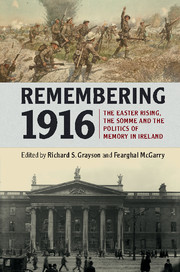Book contents
- Frontmatter
- Contents
- List of figures
- List of tables
- List of contributors
- Introduction
- Part I Memory and commemoration
- 1 Making sense of memory: coming to terms with conceptualisations of historical remembrance
- 2 Ritual, identity and nation: when the historian becomes the high priest of commemoration
- 3 ‘The Irish Republic was proclaimed by poster’: the politics of commemorating the Easter Rising
- Part II Narratives
- Part III Literary and material cultures
- Part IV Troubled memories
- Index
1 - Making sense of memory: coming to terms with conceptualisations of historical remembrance
from Part I - Memory and commemoration
Published online by Cambridge University Press: 05 March 2016
- Frontmatter
- Contents
- List of figures
- List of tables
- List of contributors
- Introduction
- Part I Memory and commemoration
- 1 Making sense of memory: coming to terms with conceptualisations of historical remembrance
- 2 Ritual, identity and nation: when the historian becomes the high priest of commemoration
- 3 ‘The Irish Republic was proclaimed by poster’: the politics of commemorating the Easter Rising
- Part II Narratives
- Part III Literary and material cultures
- Part IV Troubled memories
- Index
Summary
In considering remembrance of historical events, thought must first be given to what we mean by ‘memory’. Obsessive preoccupation with this theme over the past thirty years or so has been labelled a ‘memory boom’. Irish scholarship caught up with this intellectual development at a delay but produced nonetheless a number of noteworthy publications, ranging from the trailblazing collection of essays edited by Ian McBride on History and Memory in Modern Ireland (2001) to the theoretically sophisticated four volumes of Memory Ireland edited by Oona Frawley (2010–2014). In much of the voluminous literature, memory remains an elusive notion. It is therefore worth clarifying some of the key conceptualisations of historical memory and, while taking note of the strengths and limitations of each concept, suggesting how these terms can be employed in an exploration of remembering 1916.
Although the study of memory is inherently interdisciplinary, historical discussions have seldom engaged with models developed by neuroscientists and are mostly unconcerned with the concepts of memory developed by cognitive psychologists. In its most immediate sense, historical remembrance is associated with the recollections of participants and eyewitnesses of historical events. These personal recollections are influenced by the contexts in which they were recorded, which is typically at a remove from the events. Although they are sometimes cited unproblematically as factual evidence, witness testimonies reflect how 1916 was remembered in the specific circumstances of their documentation, whether in support of an application for a military service pension, as a lasting statement for posterity given to the Bureau of Military History or in response to the inquiry of interested scholars. These memories were remoulded with the passing of time. For example, the Easter Rising is absent in the memoir of Ernie O'Malley, written during the events, but appears as a significant moment of political conversion in the stylish autobiography he published twenty years later. Analysis of such sources requires proficiency in the methodologies of oral history, which can be applied to mine details that shed new light on the past, as well as to appreciate how the past was subjectively remembered in a changing present.
In his pioneering work on collective memory, Maurice Halbwachs forcefully posited that remembrance is not an autonomous activity of an individual but is dependent on the social contexts in which it takes place.
- Type
- Chapter
- Information
- Remembering 1916The Easter Rising, the Somme and the Politics of Memory in Ireland, pp. 13 - 23Publisher: Cambridge University PressPrint publication year: 2016
- 2
- Cited by



